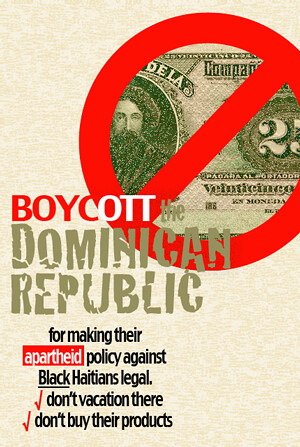Talk about shock and awe. In what is being termed a "breakthrough," yesterday, the IMF announced that Haiti would not be forced to take a loan out for rebuilding. The new $100 million dollar debt the IMF gave to Haiti for reconstruction will be canceled.
Haiti is still grappling with loans that it will realistically never be able to pay back in light of the catastrophic earthquake of January 12, 2009. However, a group of countries called the Paris Club (Interesting name. Wonder why they chose that? Oh, right, they meet each month in Paris), namely, Canada, France, Italy and the United States, have urged Haiti's creditors to cancel the debt.
"The Paris Club said that last July its members canceled all their claims on Haiti, at that time totaling $214 million."“Considering the financing needs that Haiti will face in reconstructing the country, Paris Club creditors call upon other bilateral creditors also to urgently provide full debt cancellation to Haiti,”In the same NY Times article quoted above, there was a very disturbing quote from Greg Barrows a spokesman for the World Food Program, explaining why aid has been hampered from getting to Haitians in need:
He said diesel fuel was being shipped in from neighboring Dominican Republic by road and the convoys required a security escort.
Because of the lack of security in Port-au-Prince, he said, “we had to scale back some distributions, not because we weren’t able to reach the people but because we didn’t have security.”
Conversely, folks on the ground are reporting that they have not witnessed any undue cause for concern over security issues.
Since we arrived in Port au Prince everyone has told us that you cannot go into the area around the palace because of violence and insecurity. I was in awe as we walked into downtown, among the flattened buildings, in the shadow of the fallen palace, amongst the swarms of displaced people there was calm and solidarity. We wound our way through the camp asking for injured people who needed to get to the hospital. Despite everyone telling us that as soon as we did this we would be mobbed by people, I was amazed as we approached each tent people gently pointed us towards their neighbors, guiding us to those who were suffering the most.Also, from the UK Independent, Andy Kershaw: Stop treating these people like savages:
(The runways, incidentally, at this allegedly grid-locked airport were, during Snow's broadcasts, disturbed by just one aircraft. The US military, now running the control tower, says there is no room to park more planes. Over Snow's shoulder, one could see acre upon acre of empty airport outfield.)The alarmingly unanimous priorities of the spokesmen and women of aid organisations and the military, have been with "issues" (for they love that word) of "security", "procedures", and "logistics" (what we used to call "transport" or "trucks"). These obsessions indicate not only a self-serving and self-important careerist culture among some, though not all, aid workers (although wide experience of the profession in Haiti and across Africa tells me it is more common than donors would like to think), but that the magnitude of the crisis has paralysed them into a gibbering strike force of box-tickers. Most worryingly, it reveals that many – even selfless – NGO workers on the ground haven't a clue about the country and its people.
There has now solidified a consensus among aid organisations that the relief they are bringing is itself a liability; that distributing what Haitians are dying for – literally – will bring on a second nightmare. So, supplies pile up at the airport because, apparently, the Haitians need to be fed and watered at gunpoint. And there aren't enough men with guns to provide this totemic "security" and there aren't enough trucks to move the supplies around the country. (Haiti is always absolutely full of trucks. The first relief priority ought to be fuel for those convoys, to deliver the water, medicines and food. In that order).
It is very good that Haiti is getting unprecedented support, but it is very sad that the people are dying for lack of medical help in great numbers. The death toll after the quake may exceed the death toll from the earthquake itself.
Fortunately there is a light at the end of the tunnel for Haiti. After pressure from around the globe, the IMF announced yesterday that it will not be lending $100 million to Haiti for reconstruction. The IMF is making the $100 mil. a grant to Haiti.
In June 2009, the World Bank, IMF, and IDB canceled $1.2 billion of Haiti's debt. This amounted to a huge portion of Haiti's debt, but Haiti still owed about $891 million dollars. Most of the debt is owed to the IDB ($429 million), IMF ($165 million) and the World Bank ($38 million).
The head of the IMF Dominique Strauss-Kahn was interviewed in Hong Kong for his reaction to the catastrophe.
“My belief is that Haiti— which has been incredibly hit by different things—the food and fuel prices crisis, then the hurricane, then the earthquake—needs something that is big. Not only a piecemeal approach, but something which is much bigger to deal with the reconstruction of the country: some kind of a Marshall Plan that we need now to implement for Haiti.
...“The most important thing is that the IMF is now working with all donors to try to delete all the Haitian debt, including our new loan. If we succeed—and I'm sure we will succeed—even this loan will turn out to be finally a grant, because all the debt will have been deleted. And that's the very important thing for Haiti now,” the Managing Director added.”






1 comment:
excellent assessment of the sliding scale of the reportage from the major news players. maybe some folks will start to see through the veil and realize tht this is all a major hollywood sized cover up.fingno
Post a Comment